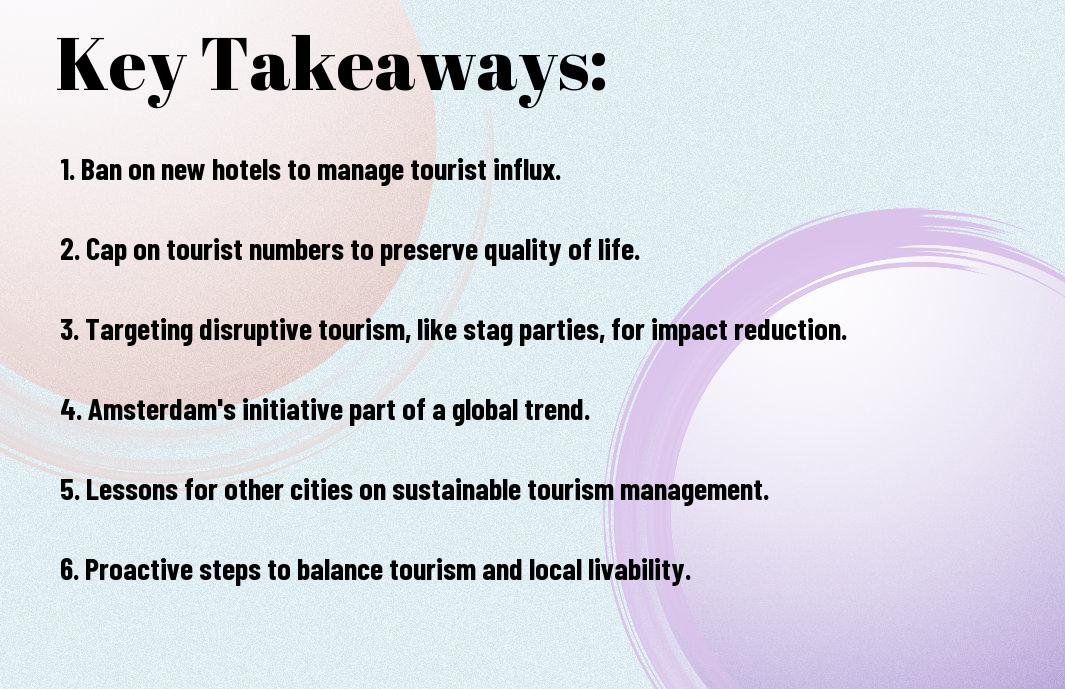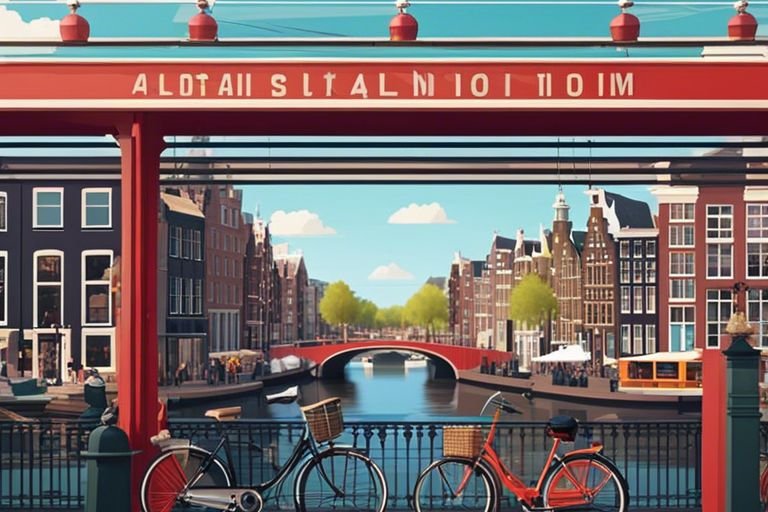
Amsterdam, one of Europe’s most enchanting cities, is taking a stand against overtourism with a daring strategy catching global attention. To preserve the city’s livability for residents and enhance the experience for visitors, Amsterdam has imposed a ban on the construction of new hotels. This radical measure is part of a comprehensive plan to manage the overwhelming influx of tourists straining the city’s resources and infrastructure. Check out Amsterdam Bans New Hotel Construction To Battle Overtourism for more details on this groundbreaking decision.
Key Takeaways:
- Construction Ban: Amsterdam has banned the construction of new hotels to manage overtourism and prevent negative impacts on the city’s resources and infrastructure.
- Cap on Tourist Numbers: The city has set a limit of 20 million hotel overnight stays per year to balance tourism, maintain a high quality of life for residents, and reduce the number of river cruises allowed.
- Targeting Disruptive Tourism: The “Stay Away” campaign targets specific types of tourists, such as British men on stag parties, to discourage visits that disrupt local life and strain city resources.


Hotel Construction Ban
To address the pressing issue of over-tourism, Amsterdam has implemented a groundbreaking policy that bans the construction of new hotels in the city. This bold move is crucial to managing the overwhelming influx of tourists that has strained the city’s resources and infrastructure.
Under the new rules, a new hotel can only be built if an existing one closes, ensuring that the number of hotel rooms available does not increase net. This measure is part of a broader effort to reduce the negative impacts of overtourism, such as environmental degradation, disruption to local life, and damage to historical sites.
Moreover, any new hotel must demonstrate added benefits to the city, such as improved sustainability practices. This criteria ensures that new accommodations contribute positively to the city’s overall quality of life and environmental sustainability.

Tourist Cap Imposed
While Amsterdam is undeniably a popular destination for tourists from around the world, the city has recently taken bold steps to tackle the issue of overtourism. With an overwhelming influx of tourists straining its resources and infrastructure, the local government has imposed a cap on the number of tourists allowed to stay overnight in the city. This limit has been set at 20 million hotel overnight stays per year, a move aimed at striking a delicate balance between welcoming visitors and preserving the high quality of life for the city’s residents.
In addition to the cap on overnight stays, Amsterdam has restricted the number of river cruises allowed in the city. While popular among tourists, these cruises have been identified as a significant contributor to overcrowding, especially during peak tourist seasons. By imposing limitations on this form of tourism, Amsterdam hopes to mitigate the negative impacts of over-tourism and maintain a more sustainable tourism model.
Furthermore, as part of its comprehensive tourism policy, Amsterdam has implemented a ban on the construction of new hotels in the city. This measure ensures that the number of hotel rooms available does not increase net unless an existing hotel closes. Any new hotel seeking approval must demonstrate added benefits to the city, such as improved sustainability practices.
By taking such decisive actions, Amsterdam sets a precedent for other popular tourist destinations grappling with similar challenges. The city’s proactive approach to managing over-tourism through these new regulations reflects a commitment to sustainable development and responsible tourism practices. As other cities observe the outcomes of Amsterdam’s policies, similar strategies will likely be considered and implemented worldwide in the ongoing battle against over-tourism.
Targeting Disruptive Tourism
Some forms of tourism can disrupt a city’s daily life and culture. In response, Amsterdam launched the “Stay Away” campaign in 2023. This initiative specifically aims to deter tourists who come to the city for its nightlife and liberal drug and alcohol policies.
The campaign is particularly focused on British men aged 18 to 35 who visit for stag parties and often cause disturbances and inconveniences to local residents. By identifying and discouraging these specific groups of tourists, Amsterdam seeks to preserve the peace and harmony of the city for its residents.
Targeting disruptive tourism not only helps alleviate the negative impacts on the local community but also contributes to creating a more positive and welcoming environment for visitors who are genuinely interested in Amsterdam’s cultural and historical aspects.
Global Trend Acknowledged
Any city that has experienced the overwhelming impact of over-tourism knows the challenges it brings. The strain on resources, the disruption to local life, and the damage to historical sites are undeniable consequences of unchecked tourism. Recognizing these issues, cities worldwide are taking note of Amsterdam’s bold move to curb overtourism and are starting to follow suit.
Amsterdam’s ban on the construction of new hotels sets a precedent in the global tourism industry. By controlling the growth of accommodation options, the city is sending a clear message that quality of life for residents and resource sustainability are top priorities. This proactive approach resonates with cities facing similar challenges, prompting them to rethink their tourism policies.
Another crucial step that cities are beginning to consider is implementing a cap on tourist numbers. By limiting the number of overnight stays, Amsterdam is striving to strike a balance between catering to tourists and maintaining the city’s charm for its residents. This targeted approach to managing visitor numbers is a strategy other cities are closely watching.
Addressing disruptive tourism is a crucial aspect of Amsterdam’s strategy that is gaining attention worldwide. By launching campaigns specifically aimed at discouraging certain types of tourists, such as those attracted to the city’s nightlife and liberal drug policies, Amsterdam is taking proactive measures to protect its local communities. This targeted approach to managing tourist behavior inspires other cities to develop similar initiatives.
As Amsterdam paves the way in combating over-tourism, cities globally are learning from its experiences and drawing inspiration from its innovative solutions. The success of Amsterdam’s policies will undoubtedly shape the future of urban tourism management, guiding cities toward sustainable practices that prioritize the well-being of residents and visitors.
To wrap up
Hence, Amsterdam’s bold move to curb over-tourism by banning new hotel constructions, imposing caps on tourist numbers, and targeting disruptive tourism sets a significant precedent in urban tourism management. By prioritizing the preservation of the city’s livability and historical charm while still welcoming tourists, Amsterdam is leading the way in balancing economic benefits with environmental and social sustainability. The city’s proactive approach to addressing over-tourism challenges is a valuable model for other popular tourist destinations grappling with similar issues.
As Amsterdam continues to implement and adjust its policies to manage over-tourism, the success or failure of these measures will undoubtedly provide essential insights for global urban tourism management. By taking decisive action to maintain a harmonious balance between residents’ quality of life and tourist influx, Amsterdam showcases the importance of sustainable tourism practices in ensuring that cities remain vibrant, welcoming, and resilient despite increasing visitor numbers. Amsterdam’s strategic initiatives underline a pivotal narrative in modern urban governance, emphasizing the necessity of fostering sustainable tourism practices to support cities’ long-term well-being and prosperity worldwide.
FAQ
Q: What is Amsterdam’s new strategy to address overtourism?
A: To curb overtourism, Amsterdam has banned the construction of new hotels and capped the number of tourists allowed to stay overnight in the city.
Q: What negative impacts of overtourism prompted Amsterdam’s new policy?
A: The negative impacts of overtourism include environmental degradation, disruption to local life, and damage to historical sites in Amsterdam.
Q: How does the ban on new hotel construction work in Amsterdam?
A: Under the new rules, a new hotel can only be built if an existing one closes, ensuring no net increase in hotel rooms available in the city.
Q: What is the cap’s purpose on Amsterdam tourist numbers?
A: The cap on tourist numbers, limited to 20 million hotel overnight stays per year, aims to strike a balance between welcoming tourists and maintaining a high quality of life for residents in Amsterdam.
Q: How is Amsterdam targeting disruptive tourism under its new policy?
A: Amsterdam launched the “Stay Away” campaign to discourage visits from tourists attracted by nightlife and liberal drug/alcohol policies, mainly targeting British men aged 18 to 35 visiting for stag parties that disrupt local life.



